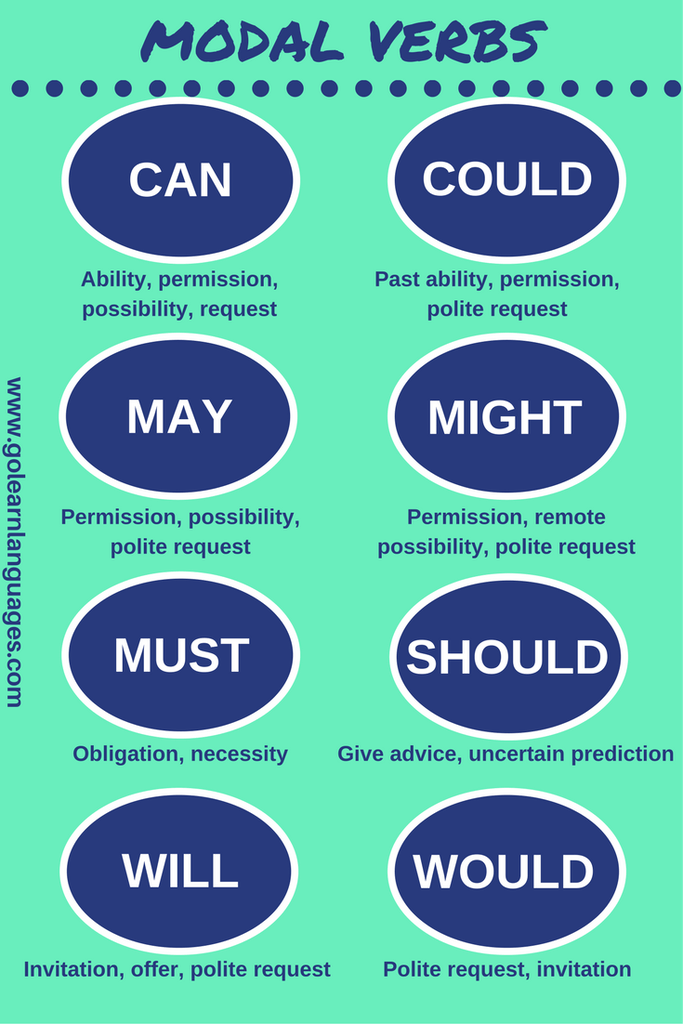Modal Verbs | Choose the correct substitute for each modal verb. In the present tense it has the same feeling as a command. The put your knowledge to the test in the free interactive exercises. They express ability, permission, possibility, obligation etc. Please make sure you subscribe to the free grammar updates here
They express ability, permission, possibility, obligation etc. Vouloir, pouvoir and devoir are called modal verbs. Questions with auxiliary & modal verbs : Modal verbs are a type of auxiliary verb which express the mood of another verb. The modal verbs in english grammar are can, could, may, might, must, need not, shall/will, should/ought to.

Vouloir vouloir expresses a strong will or desire; They are used to express ideas such as: Vouloir, pouvoir and devoir are called modal verbs. Possibility, prediction, speculation, deduction and necessity. It is used to form future tenses, to express willingness or ability, to make requests or offers, to complete conditional sentences, to express likelihood in the immediate present, or to issue commands. Questions with auxiliary & modal verbs : Choose the correct substitute for each modal verb. Modal verbs are usually accompanied by another verb that expresses the action. Used to for past habits : Mar 11, 2009 · form modal verbs do not have all the tenses modal verbs use other verbs to complete the tenses can is completed with be able to must is completed with have to they can play the piano they will be able to play the piano in the future you must come early you had to come early yesterday 7. It is an irregular verb in the present tense. In the present tense it has the same feeling as a command. The put your knowledge to the test in the free interactive exercises.
The put your knowledge to the test in the free interactive exercises. Used to for past habits : They are used to express ideas such as: Learn about the usage of modal verbs and their alternative forms in english grammar with lingolia's online lesson. Vouloir, pouvoir and devoir are called modal verbs.

Below is a list of modal verbs in the strictest sense (there are examples of modal auxiliary verbs, but for now they don't need to be looked at because our focus today is on modal verbs). Please make sure you subscribe to the free grammar updates here It is an irregular verb in the present tense. Learn about the usage of modal verbs and their alternative forms in english grammar with lingolia's online lesson. Modal verbs are usually accompanied by another verb that expresses the action. Modal verbs are a type of auxiliary verb which express the mood of another verb. It is used to form future tenses, to express willingness or ability, to make requests or offers, to complete conditional sentences, to express likelihood in the immediate present, or to issue commands. Thankfully, modal verbs are easier to understand with examples, because there is actually quite a shortlist of these uniquely behaving verbs. Modal verbs have the following characteristics: Replacing modal verbs by their substitutes :: We ought to win the race. The put your knowledge to the test in the free interactive exercises. Questions with auxiliary & modal verbs :
Possibility, prediction, speculation, deduction and necessity. It is an irregular verb in the present tense. Questions with auxiliary & modal verbs : Choose the correct substitute for each modal verb. We ought to win the race.

Questions with auxiliary & modal verbs : Replacing modal verbs by their substitutes :: Please make sure you subscribe to the free grammar updates here The modal verbs in english grammar are can, could, may, might, must, need not, shall/will, should/ought to. We ought to win the race. It is used to form future tenses, to express willingness or ability, to make requests or offers, to complete conditional sentences, to express likelihood in the immediate present, or to issue commands. Choose the correct substitute for each modal verb. Modal verbs are a type of auxiliary verb which express the mood of another verb. Below is a list of modal verbs in the strictest sense (there are examples of modal auxiliary verbs, but for now they don't need to be looked at because our focus today is on modal verbs). Modal verbs have the following characteristics: They are used to express ideas such as: As a modal auxiliary verb, will is particularly versatile, having several different functions and meanings. It is an irregular verb in the present tense.
Modal Verbs: It is used to form future tenses, to express willingness or ability, to make requests or offers, to complete conditional sentences, to express likelihood in the immediate present, or to issue commands.


0 comments